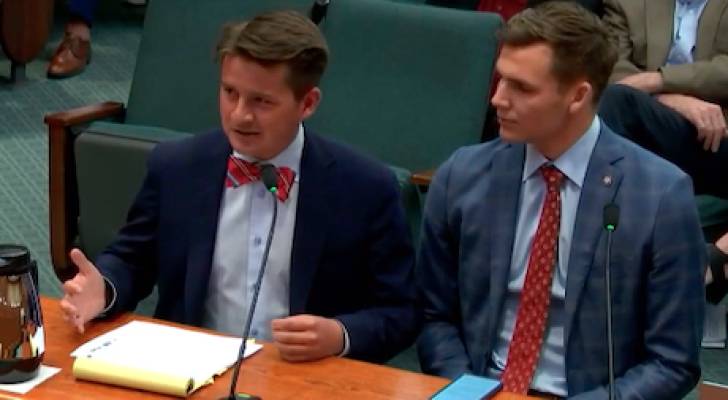
On April 14, the Texas Senate passed a new bill that prevents cities from placing limits on how many unrelated people can live in a home. The bill passed by a vote of 30 to 1 and has currently moved onto the Texas House of Representatives.
Senate Bill 1567, written by Republican State Senator Paul Bettencourt, would apply to university towns like College Station — potentially providing some relief for students looking for housing.
Don’t miss
- I’m 49 years old and have nothing saved for retirement — what should I do? Don’t panic. Here are 5 of the easiest ways you can catch up (and fast)
- Gain potential quarterly income through this $1B private real estate fund — even if you’re not a millionaire. Here’s how to get started with as little as $10
- Thanks to Jeff Bezos, you can now become a landlord for as little as $100 — and no, you don’t have to deal with tenants or fix freezers. Here’s how
The bill still limits the number of occupants based on health and safety standards. However, the city ordinances that allow only three to four people who aren’t related by blood or family ties in one dwelling would be removed, deeming it the “frat house” bill.
The bill has drawn praise and criticism from residents, city and state leaders.
But why was this occupancy bill proposed in the first place, and will it help or hinder residents of the affected locations?
Reasoning for the bill
The idea for the bill started when Texas A&M students raised awareness about the occupancy limits that make housing less affordable for students.
Around 72,000 students attend Texas A&M’s College Station campus, but only 11,000 live on campus. That means thousands of students are left to find off-campus housing, and not all properties are created equal.
A College Station Existing Conditions report showed that 58% of renters are considered “cost burdened” and that 35% of these renters are “severely cost burdened.”
That means more than half of the renters in College Town are spending at least 30% of their income on housing, while those who are severely cost burdened are spending more than 50%.
A&M student representatives argued at the November 7, 2024 Texas Local Government Senate Committee meeting that current ordinance restrictions are driving housing prices up, according to My Aggie Nation. Many students echoed their frustrations, and that housing continues to be a major challenge.
Senator Paul Bettencourt was present at the meeting and declared the need for action, saying, “We’re gonna have to do something about this,” according to My Aggie Nation.
He believes that ordinance restrictions force renters into more expensive options and that removing it could help ease the burden for college students.
As per the bill analysis, Senator Bettencourt also argues that the “ordinances restrict individual property owners and tenants from maximizing the use of a dwelling unit’s potential” and believes that some municipalities that have enforced them engaged in behavior that could be considered “harassment under revised penal code statutes.”
Supporters of the bill also believe that its passing would help make housing more available and affordable.
Read more: Car insurance premiums could spike 8% by the end of 2025 — thanks to tariffs on car imports and auto parts from Canada and Mexico. But here’s how 2 minutes can save you hundreds of dollars right now
Why some are opposed
Not everyone is happy about the bill passing the Senate and currently moving through the House.
According to Fox 4 News, Texas Senator Robert Nichols argued the passing of the bill could have negative consequences. Specifically, single-family zoning could disappear as developers aim to drive profits.
Nichols claims when he was mayor of Jacksonville, Texas, he received many complaints and that cities probably have a valid reason to enforce these occupancy limits.
At the March 17 hearing of the Texas Senate Committee on Local Government, he said the city had slum lords who would petition “off all these rooms and rent out the rooms” and not to believe that renters are “college kids who are trying to be good neighbors.”
Some, like a representative from the College Station Association on Neighborhoods, said during the hearing that the bill could mean that investors would snatch up homes, making it harder for families.
During a March 27 meeting with the House Land and Resource Management Committee, College Station mayor John Nichols also testified against the bill.
He argued that the city enforces the ordinance because it helps to balance the needs of housing for students and families
Councilman Bob Yancy concluded with his argument that “stuffing more people into existing properties is not the answer, more housing is.”
But for now, the fate of housing regulations is unknown until the Texas House casts its vote.
What to read next
- Want an extra $1,300,000 when you retire? Dave Ramsey says this 7-step plan ‘works every single time’ to kill debt, get rich in America — and that ‘anyone’ can do it
- Here are 5 ‘must have’ items that Americans (almost) always overpay for — and very quickly regret. How many are hurting you?
- There’s a 60% chance of a recession hitting the American economy this year — protect your retirement savings with these essential money moves ASAP (most of which you can complete in just minutes)
This article provides information only and should not be construed as advice. It is provided without warranty of any kind.